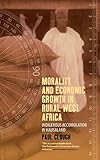Morality and Economic Growth in Rural West Africa : Indigenous Accumulation in Hausaland / Paul Clough.
Material type: TextPublisher: New York ; Oxford : Berghahn Books, [2014]Copyright date: ©2014Description: 1 online resource (468 p.)Content type:
TextPublisher: New York ; Oxford : Berghahn Books, [2014]Copyright date: ©2014Description: 1 online resource (468 p.)Content type: - 9781782382706
- 9781782382713
- 330.966976 23
- DT515.45.H38 C56 2014b
- online - DeGruyter
| Item type | Current library | Call number | URL | Status | Notes | Barcode | |
|---|---|---|---|---|---|---|---|
 eBook
eBook
|
Biblioteca "Angelicum" Pont. Univ. S.Tommaso d'Aquino Nuvola online | online - DeGruyter (Browse shelf(Opens below)) | Online access | Not for loan (Accesso limitato) | Accesso per gli utenti autorizzati / Access for authorized users | (dgr)9781782382713 |
Browsing Biblioteca "Angelicum" Pont. Univ. S.Tommaso d'Aquino shelves, Shelving location: Nuvola online Close shelf browser (Hides shelf browser)
Frontmatter -- Contents -- List of Illustrations -- Preface -- Acknowledgements -- Maps -- Introduction. Methods of Fieldwork and Analysis -- Chapter 1. An Introduction to the Political Economy and Culture of Marmara Hamlet -- Chapter 2. The Cultural Logic of Noncapitalist Accumulation -- Chapter 3. Land Distribution and Land Transfers -- Chapter 4. Farm Labour -- Chapter 5. Credit Relations and Social Consumption -- Chapter 6. Interregional Produce Markets -- Chapter 7. Rural Produce Traders and Wealth Acquisition -- Chapter 8. Economic Change from 1985 to 1998 -- Chapter 9. Continuity, Change – and Growth -- Appendix 1. Basic Information on Household Heads, Marmara, 1979 -- Appendix 2. Innovation, Agricultural Extension and Yields -- Appendix 3. All Landholding Household Heads Grouped by Labour Practices During the Weeding Operation in the Farming Season of 1978 -- Appendix 4. Household Consumption of Food Grain and ‘Soup Ingredients’ (Cefane) -- Appendix 5. Trading Purchases, Sales and Margins of M., 1978 -- Appendix 6. Land Sales and Labour Use, Marmara, 1978 and 1979 -- Glossary of Key Hausa Words in the Text -- Bibliography -- Index
restricted access online access with authorization star
http://purl.org/coar/access_right/c_16ec
The land, labor, credit, and trading institutions of Marmara village, in Hausaland, northern Nigeria, are detailed in this study through fieldwork conducted in two national economic cycles - the petroleum-boom prosperity (in 1977-1979), and the macro-economic decline (in 1985, 1996 and 1998). The book unveils a new paradigm of economic change in the West African savannah, demonstrating how rural accumulation in a polygynous society actually limits the extent of inequality while at the same time promoting technical change. A uniquely African non-capitalist trajectory of accumulation subordinates the acquisition of capital to the expansion of polygynous families, clientage networks, and circles of trading friends. The whole trajectory is driven by an indigenous ethics of personal responsibility. This model disputes the validity of both Marxian theories of capitalist transformation in Africa and the New Institutional Economics.
Mode of access: Internet via World Wide Web.
In English.
Description based on online resource; title from PDF title page (publisher's Web site, viewed 25. Jun 2024)









